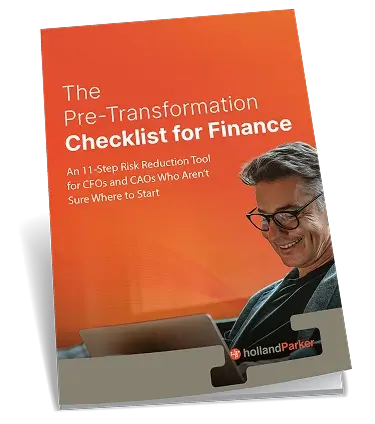

Setting and adjusting budgets in global organizations is a cyclical process that involves many different business units. Individuals and teams all have unique responsibilities driving toward the ultimate goal of maintaining fiscal responsibility, which introduces a host of different perspectives and opinions.
Naturally, as organizations become larger and expand further across the globe, the process of creating, analyzing, and updating a budget becomes exponentially more difficult. Fortunately, there is a better way to support the overall budget setting cycle and create more accurate budgets compared to the traditional way of approaching this process.
Consider the opportunity to optimize budgeting in your organization through the use of modern, innovative tools and the support of consulting experts to achieve budgetary success. You’ll discover there is an opportunity to unify business units (and opinions) to push the organization forward in a common direction.
Setting the Groundwork For the Budget Setting Cycle
Carrying out an organizational strategy not only takes time, skilled personnel, and other physical resources, but it also requires the planned expenditure of funds. Budgets help companies create a detailed map that outlines how all of these components and processes fit together.
Of course, there are often unanticipated events that disrupt even the most meticulously planned budgets. (For example, the COVID-19 pandemic.) For that reason, budgets need to be both flexible and iterative.
Budget cycles reduce the period between adjustments, allowing organizations to course-correct quickly to maintain the delivery of products and services. Here are the main phases of budget cycles for large organizations:
- Budget Preparation and Submittal
- Budget Approval
- Budget Execution
- Budget Evaluation
- Budget Adjustment
Various stakeholders generate feedback throughout the budget setting cycle and — coupling that with the dynamic nature of 21st-century business operations — it’s easy to see how different perspectives and opinions contribute to the need for constant updates.
Depending on the nature of the industry, your organization may adjust budgets on a monthly, quarterly, or annual schedule. Just like Financial Planning and Analysis, the budget-setting cycle is fraught with potential hurdles if not managed correctly on this schedule.
Pain Points in the Global Enterprise Budget Setting Cycle
From the use of outdated or manual budgeting methods to a lack of data integration across business units, organizations can experience significant challenges bringing everyone together to support the budgeting process. Let’s examine the common constraints.
Data Inaccuracies
Inaccurate data can be a pervasive problem throughout organizational business units, but it’s particularly problematic when attempting to maintain accurate budgets for the entire organization. Without accurate data to inform budgets, the process of aggregating all relevant financial information becomes even more difficult. This is particularly true when considering the sheer volume of data points that organizations generate on a daily basis.
Lack of Integration
Building on the previous issue, a lack of data integration is extremely costly for organizations. And, the cost is not just measured in terms of dollars and cents, It’s also costly in terms of time and manpower required to manage the data in order to generate, evaluate, and update budgets. It’s clear that organizations need to unify their business platforms because data silos can easily wreak havoc on the budgeting process.
Outdated Budgeting Methods
Old habits die hard. Whether your organization uses manual-entry spreadsheets or outdated ERP/CPM systems, budgeting becomes extremely difficult when methods and systems do not evolve with advancements in the market.
[elementor-template id=”5244″]
Time For a Budgeting Change?
With all of this information in mind, you may now be asking yourself whether it’s time to review your organization’s budgeting approach in 2022. Consider the opportunity to reduce the risks created by the constraints we identified and maximize the opportunity to grow through a more intelligent budgeting process.
Best Practices for the Modern Budget Setting Cycle
It’s critical that executives and stakeholders evaluate their ability to set accurate budgets on the path to achieving their financial objectives. An agile and data-driven budgeting process offers a host of benefits to organizations looking to inform their strategies while navigating uncertain market conditions.
In addition to standard best practices like improving visibility and collaboration, applying data correctly, and setting realistic goals, companies can find efficiencies by turning toward modern finance platforms to support their budget-setting cycle.
The OneStream intelligent finance platform is today’s best-in-class CPM software platform to unify Finance. Your organization will immediately see improvements in budgeting, as well as forecasting, financial planning and signaling, financial reporting, and financial data visualization.
Particularly in the aftermath of the global pandemic, which disrupted budget planning across all industries, OneStream is providing finance teams with the support they need to steady the ship.
But, we understand that a new digital infrastructure takes time and resources to implement. Fortunately, partnering with a firm such as HollandParker will enable you to implement OneStream in an expedient and cost-efficient manner to start realizing the immediate benefits.
By working with our team of experienced implementation consultants, you’ll be able to automate processes, replace outdated systems, align goals across departments, and apply live data for better budgeting results.
Work With HollandParker to Migrate to OneStream
As a Diamond-Level OneStream implementation partner, our team consists of true experts capable of supporting implementation and system management at the enterprise level. Our approach is based on industry best practices and extensive experience with the OneStream platform. From a financial operations perspective, we specialize in:
- Budgeting and Forecasting support
- Strategic Planning and Modelling
- Bridging Disconnects between Business Units
- Leveraging Predictive Analytics to Support Intelligent Budgeting
Creating the ideal budget-setting cycle is more important than ever this year. Executives and stakeholders within global organizations require real-time, data-driven budgets that outline how to best utilize finances, personnel, and other resources over the coming months, quarters, and fiscal years.
Flexibility, a characteristic that is often in short supply for budget creation, is now a non-negotiable for success. With the right CPM software system in place and a team in your corner ready to accelerate the implementation process, your organization can achieve this reality.
– Contact us today to discuss the opportunity to migrate to OneStream with the support of our firm. We’ll help you take advantage of all that OneStream has to offer to support the all-important budgeting process in your organization.





